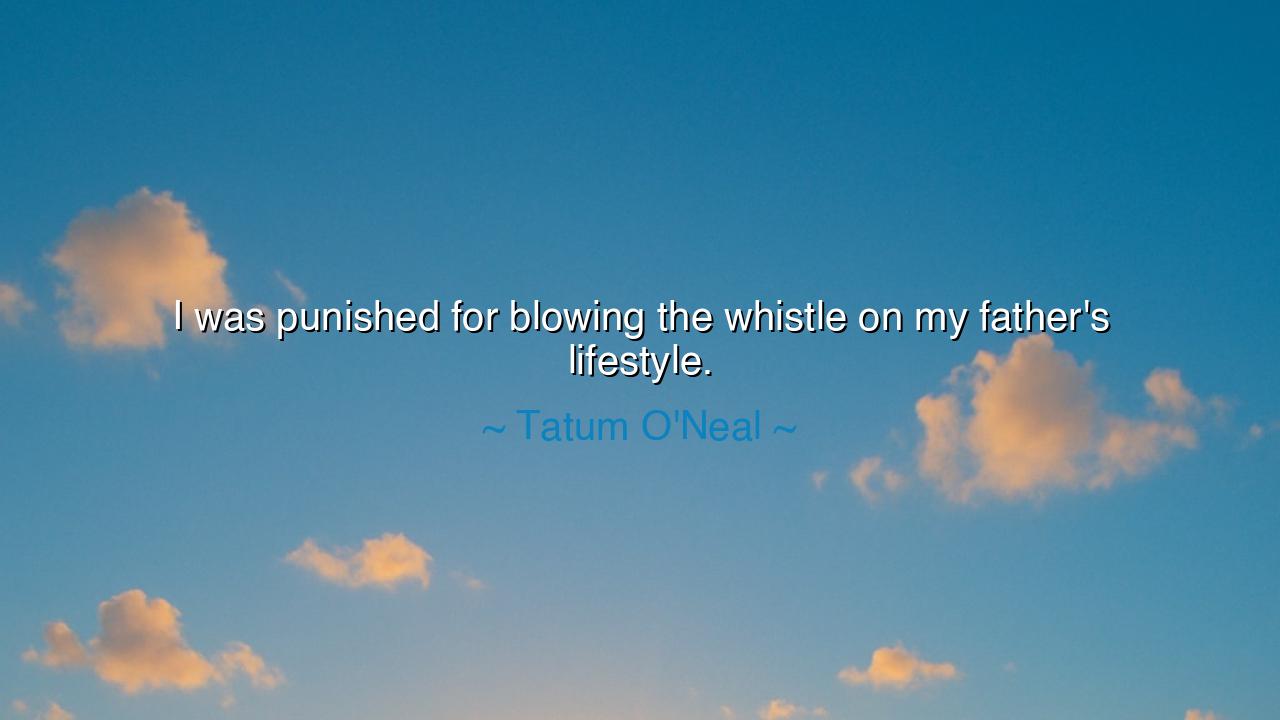
I was punished for blowing the whistle on my father's lifestyle.






The words of Tatum O’Neal—“I was punished for blowing the whistle on my father’s lifestyle”—speak not only of one woman’s pain, but of a universal truth that echoes through the ages: that truth-tellers often suffer for their honesty, especially when that truth exposes the faults of those in power, or those we are taught to love beyond question. Her confession is not a mere recollection of family strife; it is the lament of one who dared to speak against silence, and paid the price for her courage. It reveals the ancient paradox of virtue: that righteousness often brings not reward, but rejection.
In the ancient world, such words might have been spoken by Cassandra, the prophetess of Troy, cursed to see the truth yet never be believed. Like Cassandra, Tatum O’Neal became a bearer of unwelcome revelation. To “blow the whistle” on her father’s lifestyle—whether that lifestyle was marked by moral failing, emotional neglect, or the excesses of fame—was to break a sacred taboo: the silence surrounding family, loyalty, and reputation. Society has long punished those who pull back the veil, for truth unsettles the comfortable and exposes the hypocrisy of the revered. In her own way, O’Neal stands among the eternal lineage of those who have spoken truth to power, and found themselves cast out for it.
Her story is a tragedy born of love’s collision with honesty. The father, in the ancient sense, is both symbol and soul—the giver of life, the source of guidance, the mirror through which a child first sees the world. To speak against him is to risk shattering that mirror, to risk exile from the very bond that once defined safety. O’Neal’s punishment, then, was not only external—it was spiritual. She was condemned not by strangers, but by her own kin, by those who could not bear the reflection she held up before them. This is the heaviest burden of the truth-teller: not the enmity of the world, but the loss of belonging among one’s own.
History gives us many who bore the same cross. Consider Socrates, who dared to challenge the moral decay of Athens and was condemned to drink the hemlock. His only crime was asking his fellow citizens to see themselves clearly, to live by reason and virtue rather than vanity and indulgence. Like Tatum O’Neal, he was punished for speaking truth—and like her, he exposed the uncomfortable reality that those who most need correction are often the least willing to receive it. Both remind us that to awaken conscience in others is to invite their wrath, for conscience, once stirred, demands change.
Yet there is also strength in such suffering. The one who speaks truth, though wounded, becomes a vessel of light. O’Neal’s pain is the mark of her integrity—proof that she valued honesty above comfort, clarity above illusion. The ancients would have said that the gods favor such souls, for they purify the world through their trials. Her story teaches that even when truth divides, it liberates the heart that speaks it. The chains of silence, once broken, can never again bind the soul that has chosen authenticity over fear.
But her words also carry a warning to all generations: that in families, communities, and nations alike, truth must not be punished, or corruption will thrive. When those who reveal wrongdoing are silenced, the disease of deceit spreads unchecked. Whether in the halls of government or the hearth of the home, it is the same law that governs peace: truth must be protected, even when it hurts. The wise must learn not to resent the messenger, but to heed the message. Only then can reconciliation and healing begin.
So, dear listener, let the lesson of Tatum O’Neal be this: speak the truth, even when it costs you. Do not expect applause for your courage; expect resistance, and meet it with grace. Those who live in illusion may call you disloyal, but time will prove your loyalty was to what is right, not what is easy. And if you find yourself punished for your honesty, remember that the ancients called such suffering sacred—it is the price of moral clarity, the fire through which the soul is refined.
In the end, O’Neal’s words are not of bitterness, but of witness. They tell us that to expose darkness is to bring forth light, even when that light burns the one who holds it. May we, too, find the strength to bear that flame—to confront the falsehoods of our age and our own hearts, to speak truth not out of pride, but out of love. For truth, once spoken with courage, does not perish—it becomes the seed of transformation for generations yet to come.






AAdministratorAdministrator
Welcome, honored guests. Please leave a comment, we will respond soon